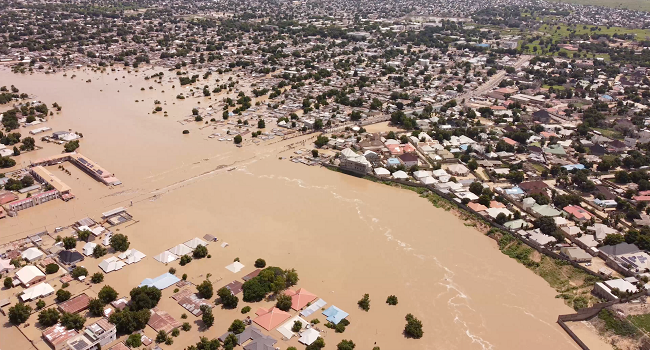The National Emergency Management Agency (NEMA) said that 1,243,638 Nigerians were displaced by floods in 2024, with 1,237 lives lost.
The Director-General of NEMA, Mrs Zubaida Umar, said this at a stakeholders engagement on national disaster preparedness and response campaign 2025, held in Owerri on Tuesday.
Umar, represented by NEMA’s Head of Partnership and Collaboration, Mr Evan Niko, said that the floods which affected a total of 5,264,097 persons, also affected 1,439,296 farmlands and left 16,469 persons injured.
Speaking on the theme: “Strengthening Resilience, Enhancing Preparedness and Response”, Umar called for more attention to the grassroots to save lives and build communal resilience across Nigeria.
She said that NEMA had developed climate-related risk implications, preparedness, mitigation and response actions to reduce the would-be impacts of the 2025 floods, based on the predictions by Nigerian Meteorological Agency and the Nigeria Hydrological Services Agency.
“We have embarked on various activities aimed at preventing and mitigating the expected impacts of the disaster with a view to reminding stakeholders about their responsibilities in flood disaster management.
“Today’s downscaling exercise of the 2025 seasonal climate prediction is further aimed at acquainting major emergency management stakeholders about the predictions and what is expected of them, to mitigate the expected impacts of the disaster,” he said.
Speaking, a Principal Relief Officer with NEMA, Mr Michael Ajide, described Imo as “one of the high risk states of flooding”, with Oguta and Ohaji-Egbema LGAs topping the charts.
He urged governments at all levels to invest in drainage and dam infrastructure to encourage flood resilient planning in riverine zones.
Also speaking, NEMA’s Head of Operations for Abia and Imo, Mr Nnamdi Igwe, called for remote sensing for flood mapping, rehabilitation of local drainages and strengthening of community liaison desks to ease communication and avert disasters.
A Healthcare Officer with the Nigerian Red Cross Society, Mr Ekene Ahaneku called for more collaborations with state emergency management agencies to decentralise relief efforts and achieve optimal outcomes.
The Deputy Chairman, Imo Council of Traditional Rulers, Eze Fred Nwachukwu, however, expressed readiness to effectively implement strategies for better governance outcomes at the grassroots level.
NAN


